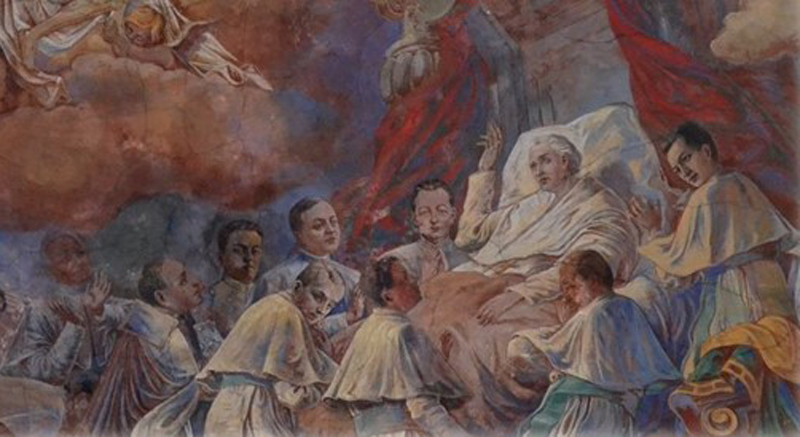(1075-1134)
St. Norbert was a German of Frankish and German stock.
As a youth, he was educated both in literature and the ways of the court and the world at the collegiate church of St. Victor in Xanten. He became a subdeacon but showed no inclination to pursue the priesthood. Rather, the wealthy, handsome, thin and somewhat tall Norbert sought approval in the courts of the great and of the emperor.
As an eloquent speaker and possessed of an affability that won him admiration and friendships, Norbert used these natural gifts, not to seek the glory of God, but to gain the love and esteem of men.
Norbert’s path in life changed when he witnessed Emperor Henry V’s mistreatment of Pope Paschal II in Rome in 1111. It left Norbert with a sense of uneasiness he could not dispel. The man who had been so happy to live at court no longer felt comfortable in that atmosphere of intrigue, where the emperor’s arrogance took the place of law. He left the court and returned to Xanten.
In late spring of 1115, Norbert was traveling on the road to Freden when a storm suddenly arose. A bolt of lightning struck the ground before his horse’s feet, and he was thrown to the ground. Shaken, he asked, “Lord what do you want me to do?” In response, he seemed to hear the words from Psalm 34, “Turn from evil and do good; seek peace and pursue it.”
Norbert underwent a profound conversion. Under the influence of grace and led by the Gospel, he became sure of one thing: he wanted to put on the new man (Eph. 4:24; Col. 3:10) and live a life of perfection in the service of the Church, according to the Gospel of Christ, and in the footsteps of the Apostles.
The once worldly man of the royal court sought ordination to the priesthood, and gave his considerable wealth to the poor, in order “that he may follow the naked cross naked” (Vita Norberti B, IX 22). Inflamed with the zeal of divine fervor, Norbert went about with “no purse, no sandals nor two tunics,” (Mark 6:8) proclaiming by his words and example the necessity of poverty of spirit in order to enter the kingdom of God. As Christ had sent out his Apostles not only “to proclaim the message,” but also “to have authority to cast out demons,” (Mark 3:15).
Norbert became well known as an exorcist, and his biographer records many instances when he was called upon to exercise this office. Regarded as a “minister of peace and concord,” he had the gift of reconciling people and establishing peace between feuding parties.
At the center of St. Norbert’s spiritual life and ministry was the Holy Sacrifice of the Mass. Contrary to custom of his times, he celebrated Mass every day, and it was after offering the Eucharistic sacrifice that he loved to preach.
In 1121, St. Norbert established the first monastery of the Regular Canonics Premostratensias in Prémontré, France. In a short period of time, he was able to attract many men and women to the Apostolic Life and to start many foundations of religious communities of this “ordo novus.” Liturgical prayer held a central place in the life of Norbert and his first companions. The Eucharist, the heart of liturgical prayer occupied such a place at Prémontré and in the life of St. Norbert that later tradition made Norbert the Apostle of the Eucharist.
In 1126, St. Norbert was elected archbishop of Magdeburg, Germany. In that capacity he dedicated himself to peace and justice, did not shy away from arguments and conflicts, neither in his own diocese nor in the conflict between emperor and pope, as he courageously defended the rights of the Church.
Norbert died on June 6, 1134, the Wednesday after Pentecost. By order of the emperor, his body was laid at rest in Abbey Church of St. Mary’s at Magdeburg, where he had installed the confreres of his Order. St. Norbert’s body was transferred to the Norbertine Abbey of Strahov in Prague in 1627 where it remains to this day and is venerated by his sons and daughters from all over the world.
St. Norbert is not only known as “the Apostle of the Eucharist, is also a patron of expectant mothers, as well as traditionally invoked by married couples who want to conceive a child, with many favors attributed to his intercession.
Adapted by A.J. Valentini from: St. Norbert |. (2018). The Bethlehem Priory of St. Joseph. http://norbertinesisters.org/st-norbert/
